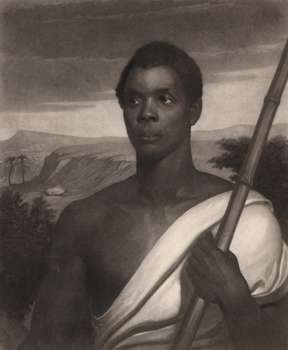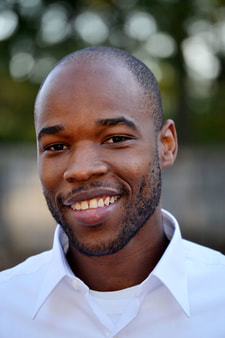
Today’s Black History Fun Fact Friday is from Joseph Ward.
Ward has prepared for us the inspiring story of Madison Washington, a formerly enslaved man who had escaped successfully and fled to Canada. Washington returned to Virginia to free his wife but was recaptured and put on a slave ship in Richmond, Virginia. Guys, Washington is the real-life Django Unchained! Not only does he free his wife, but many others.
Madison Washington was a man born into slavery in Virginia who escaped but risked his freedom to help free his beloved Susan. Washington is described as having extraordinary African features, superb leadership qualities, and a fierce spirit. They considered him a fugitive for escaping slavery and heading north to Canada, eventually finding work with a farmer named Mr. Dickenson. Even as a small child Madison would rebel against the inhumane treatment of him his slave masters, but rebellion eventually earned Washington his place in history.
Around the age of twenty Washington would meet the love of his life, the beautiful Susan, who he would make his wife. He planned to escape from slavery to free himself and his wife, but his plans didn’t work out. To prevent himself from being sold away from his wife, Madison escaped from the farm and hid in the surrounding woods for months. While in hiding he could keep an eye on his wife, he also began planning to lead a rebellion. His plans once again failed, and he eventually traveled north to Canada to live in free lands.
While in Canada Washington’s plan was to get a job and save enough money to buy the freedom of his wife Susan. He was becoming discouraged in carrying out his plans because he realized it would take five years to raise the money needed to free his wife. Washington made his mind up that he would return into the grasp of slavery to free his Susan. Mr. Dickenson the farmer tried his best to persuade Washington to take another course of action. He eventually left Canada with his wages and his freedom papers, heading south to Virginia. He could reach an area close to the farm where his wife was held but had to conceal his identity to prevent him from being captured.

Washington was still considered a fugitive, and anyone who recognized him would have blown his cover. Being a man of tact and organization, Washington carried miniature files and saws within the lining of his coat; these would help him break out of any chains used to restrain him. “Liberty is worth nothing to me while my wife is a slave,” said Washington as he held conversations with fellow travelers who tried to convince him to abandon his plans.
As Washington traveled closer to the farm that held his wife, he was forced to travel at night for fear of being recognized by someone. He found temporary shelter in the woods near the farm and tried to get information about her but was unsuccessful. One night while in hiding, he heard singing off in the distant woods; the singing was coming closer and closer to where he was hiding. As he investigated the singing, he became a part of the singing, there he learned that he stumbled upon a “corn shucking.”
A “corn shucking” was a mass gathering of slaves who pealed loads of corn, and after pealing the corn they were able to have a huge dinner with whiskey and dancing, which was provided by the owner of the plantation where the corn shucking took place. Washington refused to eat the food for fear of being discovered. He also was very careful to ask only a few questions and remain in the shadows. At the corn shucking, he learned that his wife had not been sold and was still on the old farm.
Being too eager to see his wife, Washington entered the parameter of the farm but was spotted by an overseer. The overseer then alerted the other white overseers on the farm. The first three men to approach Washington was struck in the face and knocked to the ground unconscious. Eventually, Washington was subdued, shipped to Richmond, Virginia, and sold to the slave owners Johnson and Eperson. New Orleans was the destination for The Creole, a slave ship controlled by Captain Enson and owned by Johnson and Eperson.

Washington and one-hundred and forty-four other slaves were loaded upon The Creole along with other cargo the men were shipping to New Orleans. As they loaded the slaves upon The Creole, the men were placed in one cabin and the women were placed in another. For fear of rebellion, the men were heavily chained, and Washington particularly was chained to the floor of the cabin. The women were not chained and were able to roam their cabin freely.
As Washington lay chained to the floor, his attitude was rather jovial than the expected gloom the other slaves displayed. The overseers didn’t know that while Washington was displaying a docile and cooperative attitude; he was secretly picking the men he would use to overthrow The Creole. They also didn’t know that Washington still carried his mini saws and files within the lining of his coat to use when the time was right.
In 1841, on the ninth day of the voyage, The Creole encountered rough seas which made several slaves very sick. Because some slaves were sick, the overseers did not watch them properly, this created the perfect opportunity for Washington and his men to attack. Washington used his mini saw and file to free himself and at least eighteen other men. Once free, the slaves found weapons and made their way to the deck where the ship’s crew was stationed. When the slaves attacked the ship’s crew it was unexpected, and it startled the crew, the men barley moved to make them easy targets for the slaves.
Hewell, the Black slave driver, and others from the crew drew their guns and shot some slaves. Washington spotted Hewell shooting his gun, approached him from behind, and struck him in the head, wounding him severely. Washington led his men into battle with iconic flair, fueling his men to earn their victory; the slaves then dominated the crew and gained control of The Creole. Washington’s men wanted to kill the remaining crew members who were still alive, but Washington allowed no more killing. He was not interested in killing the men, only gaining the freedom of his people and his wife.
The next morning, Madison Washington was named “Captain Washington,” commander of The Creole, by his men. That same morning, Washington requested that the cook prepare a wonderful meal for the men and women who were once captives on the ship. This meal would be the first time the men and women would see each other. Little did Washington know his beautiful wife Susan was one of the women held in the cabin on The Creole. As they served the meal, enslaved men and women mingled for the first time as free human beings. Washington and Susan spotted each other and shared a passionate, tearful reunion. After years of being separated because of slavery, Madison and Susan Washington were once again husband and wife.

Madison Washington and his men defeated the crew of the Creole, and Washington ordered that the men not be killed and their wounds treated. Once the wounds of the white men healed they tried to regain control of the ship but were defeated once more. Because of the bravery and brilliance of Washington, one-hundred, and forty-four, people could gain their freedom upon The Creole. The Creole didn’t make it to New Orleans, instead, Washington and his men landed in Nassau, Bahamas because they learned it was a free island. Washington was determined to free his wife, and his determination and love for his wife led to him freeing others he did not know.
The Story of Madison Washington and The Creole is a story many of us have never heard before; a man of African lineage who embraced freedom could not only change history but change the lives of others. This story is important because it shows that once organized black people can gain their freedom. It also exemplifies the commitment of a black man to his black wife, which is counter to the normal narrative which usually degrades the black family. If we unite and trust each other we can make the impossible, possible.

Mr. Madison Washington, we proudly stand on your shoulders.
– JA Ward
References:
https://en.wikipedia.org/wiki/Madison_Washington
https://newsone.com/2762407/the-creole-slave-revolt-1841/
https://loa-shared.s3.amazonaws.com/static/pdf/Brown_Madison_Washington.pdf

Website: www.ontheshoulders1.com
IG & Twitter: @Joseph Ward
YouTube: https://www.youtube.com/watch?v=FxJI7ykLdNA
Facebook: On the Shoulders of Giants
Joseph A. Ward is a graduate of Florida A&M University (FAMU) and holds a Bachelor’s degree in Psychology. Ward is a graduate of the “New Hope Program” with the Florida Department of Health (DOH) in Leon County and has served as a co-facilitator of the program for over seven years, teaching life and professional skills to underprivileged persons. In addition to co-facilitating this program, he also helped establish the FAMU chapter of Men of Strength (MOST) and currently serves as its co-facilitator.
Over the past 14 years, Mr. Ward has dedicated himself to studying the history and the culture of the African diaspora. He is the founder of On the Shoulders of Giants, Inc., author of On the Shoulders of Giants Vol: 1 North America, and On the Shoulders of Giants Vol: 2 Central America. He is also the host of The Freedom Train Podcast Series and The Fix Sports Podcast.
Mr. Ward’s commitment to his community has proven him to be a reputable teacher, coach, trainer, and motivator. He is dedicated to uplifting and educating individuals around the world while helping to create mindsets and environments which foster greatness.

Click here to learn more about the On the Shoulders of Giants book series!!
Check out more Black History Fun Fact articles here. Want to be featured on this blog? Write and submit your own Black History Article! Click here for submission guidelines.



